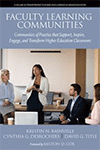
Faculty Learning Communities
Communities of Practice that Support, Inspire, Engage and Transform Higher Education Classrooms
Edited by:
Kristin N. Rainville, Sacred Heart University
Cynthia G. Desrochers, California State University, Northridge
David G. Title, Sacred Heart University
A volume in the series: Transforming Teaching and Learning in Higher Education. Editor(s): Kristin N. Rainville, Sacred Heart University. David G. Title, Sacred Heart University. Cynthia G. Desrochers, California State University, Northridge.
Published 2024
This edited book on Faculty Learning Communities (FLCs) provides and explores powerful examples of FLCs as a impactful form of professional learning for faculty in higher education. The chapters describe faculty learning community initiatives across different fields of study and within dynamic and flexible teaching and learning models. Contributing authors provide a framework for faculty learning communities, show the impact of faculty learning communities on teaching practices or student learning, and describe how these communities of practice can lead to institutional change. The book’s foreword, by Milton D. Cox, investigates the changes in the FLC world over the past decade: the influence of Communities of Practices (CoP), recent recommendations about virtual FLCs and CoPs, and the positive affirmation for FLCs that implementation science has provided.
CONTENTS
Foreword: The Transformation of Faculty Learning Communities Over the Last 10 Years and a Look Ahead, Milton D. Cox. Designing for Student Success: Using the Faculty Learning Community Model to Prepare Faculty for Deeper Engagement in Student Success, Sarah Dalrymple, Devshikha Bose, and Susan Shadle. Integrating Adaptive Practices in an FLC: Centering Trauma-Informed Principles Across a Learning Community Program, Richie D. Gebauer, Bethany L. Van Brown, and Nancy L. Watterson. Factors Influencing the Effectiveness of Teaching-Focused Faculty Learning Communities, Katerina V. Thompson, Ann C. Smith, Alice E. Donlan, and Gili Marbach-Ad. A Collaborative Teaching Journey by Graduate Faculty: Building a Principal Preparation Program Through a Team Approach, Cathy Gabro, Katie Walker, Dusty L. Palmer, Irma L. Almager, Vanessa de Leon, and Fernando Valle. Living Large: Our Journey as a Multidisciplinary Faculty Learning Community Focused on Student Engagement in Large Classes, Mark Lubrick, David Andrews, Judy Bornais, Don Bourne, Melanie Rose, Clayton Smith, Jacqueline Stagner, and Dora Cavallo-Medved. Collaborative Data Inquiry for Program Improvement: Shifting From External to Internal Motivations and Processes, Leslie S. Rush, Alan Buss, Andrea C. Burrows Borowczak, Colby Gull, and Judy Yates. Leveraging Professional Learning Communities for Institutional Change, Meagan E. Ita, Laine E. Rumreich, and Alan Kalish. Covalent Bonds and Communities of Practice: The Impact of STEM Faculty Communities of Practice, Susan Haarman, Emma Feeney, Sandra Helquist, Patrick M. Green, and Susan McCarthy. A National Network of Regional Communities of Practice: The COMmunities for Mathematics Inquiry in Teaching (COMMIT) Network, Kelly Gomez Johnson, Paula Jakopovic, Amy Ksir, Patrick X. Rault, Christine von Reness, and Nina White. Improving Student Learning Through Research: Creating an Interdisciplinary SoTL Faculty Learning Community, Colleen A. Reilly. Faculty Instructional Teams: An Innovative Approach to Better Preparing Elementary Teacher Candidates, Raven Robinson, Rebecca West Burns, Anne Dizon Crowthers, Jeania Jones, Tia Kimball, Adrien Malek-Lasater, Paul Parkison, and Nile Stanley. The Appalachian Curriculum and Instruction Mathematics Education Group as a Community of Practice and Faculty Learning Community, Tracy Goodson-Espy, Chrystal Dean, Lisa Poling, Ashley Whitehead, and Cacey Wells. A Teacher Education Faculty Learning Community as a Lever to Support Program Improvement Through Practice-Based Experiences, Jennifer Phaiah, Lindsay Keazer, René Roselle, Jim Carl, Darcy Ronan, and Katie Nagrotsky. Peer-to-Peer Collaborative Professional Learning Framework for Transferring STEM Teaching Practices, Jennifer Meadows, Kelly Moore, Sally Pardue, Leslie Suters, and Daniel VandenBerge. Empowering a Coalition of the Willing: How Instructor-Driven FLCs Are Promoting a Culture Change Toward Evidence-Based Teaching, Mascha N. Gemein, Gail D. Burd, Sarah E. Grace, Lisa K. Elfring, and Kristin Winet. Best Practices for Expanding an Undergraduate Learning Assistant Program Observations From a Learning Community of Instructors, Cynthia J. Brame, Elizabeth H. Catania, Katherine L. Friedman, Heather J. Johnson, Jessica Watkins, Hemant Badgandi, Lily Claiborne, Katherine A. Clements, Nicole Creanza, Jessica Gilpin, Lars Plate, Adriane E. Seiffert, and Thomas P. Clements. A Faculty Learning Community Promotes Teaching Self-Efficacy and Use of Student-Centered Teaching Approaches in the Biological Sciences, Gili Marbach-Ad, Michelle Bertke, Patrick Sheehan, Anna Manyak Davis, Bridgette Heine, and Katerina V. Thompson. Faculty Development Through Collaboratively Coordinated Teaching: A Case Study in Supporting and Transforming Teaching and Learning, Tabitha T. Mingus and Melinda E. Koelling. Teachers Observing Peers: The Informal Sharing of Great Teaching, Jessica Kapota, Tracy Rock, Heather McCullough. The Nexus Between Faculty Learning Communities and Peer Coaching: Potentially Powerful Implementation Partners, Kristin N. Rainville and Cynthia G. Desrochers. About the Contributors.
-
Paperback979-8-88730-444-1
Web price: $62.04 (Reg. 72.99)
-
Hardcover979-8-88730-445-8
Web price: $89.24 (Reg. 104.99)
- eBook979-8-88730-446-5

- EDU015000 - EDUCATION: Higher
- EDU001030 - EDUCATION: ADMINISTRATION: Higher
- EDU046000 - EDUCATION: Professional Development
-
 Expanding the Vision of Faculty Learning Communities in Higher Education
Emerging Opportunities for Faculty to Engage Each Other in Learning, Teaching, and Support
Expanding the Vision of Faculty Learning Communities in Higher Education
Emerging Opportunities for Faculty to Engage Each Other in Learning, Teaching, and Support
-
 Faculty Learning Communities
Working Towards a More Equitable, Just, and Antiracist Future in Higher Education
Faculty Learning Communities
Working Towards a More Equitable, Just, and Antiracist Future in Higher Education
-
 Faculty Peer Coaching in Higher Education
Partnerships to Support Improved Instructional Practices
Faculty Peer Coaching in Higher Education
Partnerships to Support Improved Instructional Practices
-
 Faculty Peer Coaching in Higher Education
Opportunities, Explorations, and Research from the Field
Faculty Peer Coaching in Higher Education
Opportunities, Explorations, and Research from the Field
-
 Institutional Diversity in American Postsecondary Education
Institutional Diversity in American Postsecondary Education
-
 Promoting Equitable Classroom Practices in Higher Education
Approaches Beyond Curriculum
Promoting Equitable Classroom Practices in Higher Education
Approaches Beyond Curriculum
-
 The Handbook for Aspiring Higher Education Leaders
The Handbook for Aspiring Higher Education Leaders

